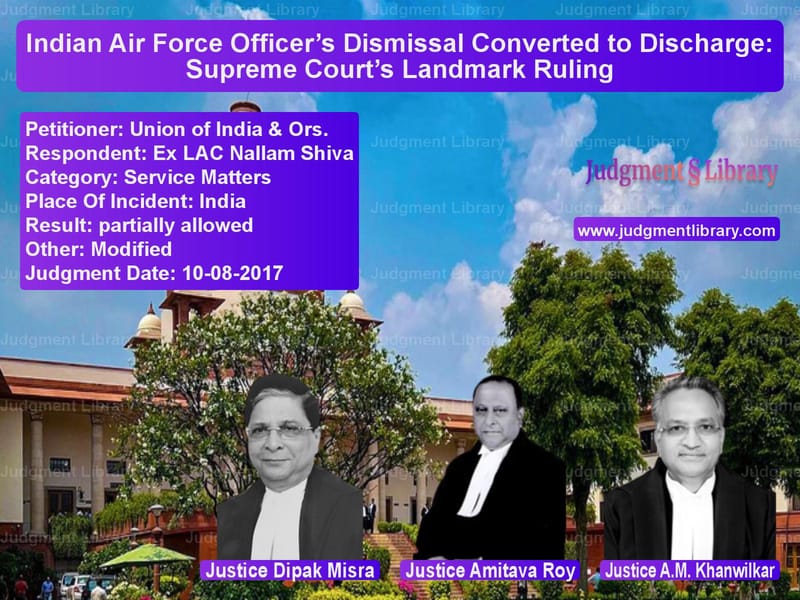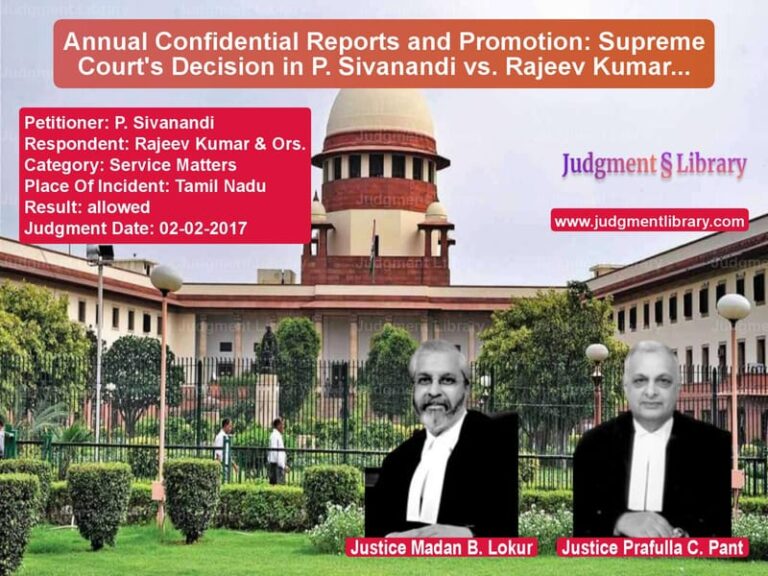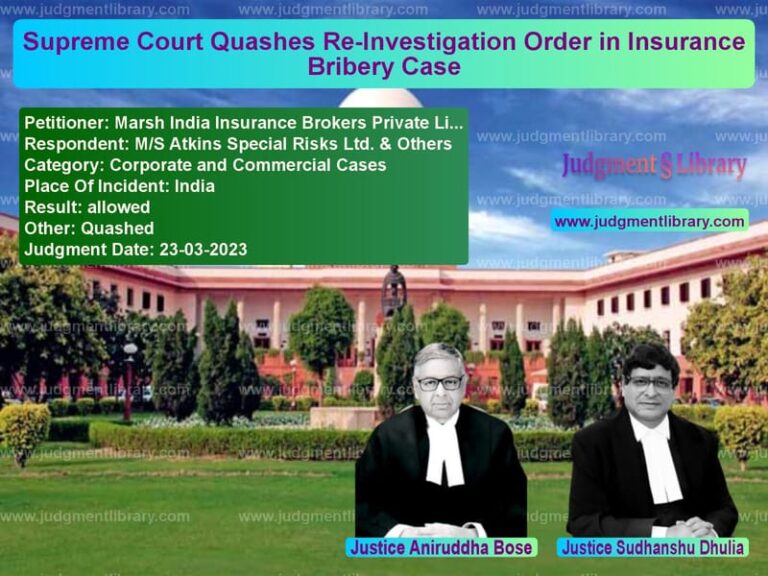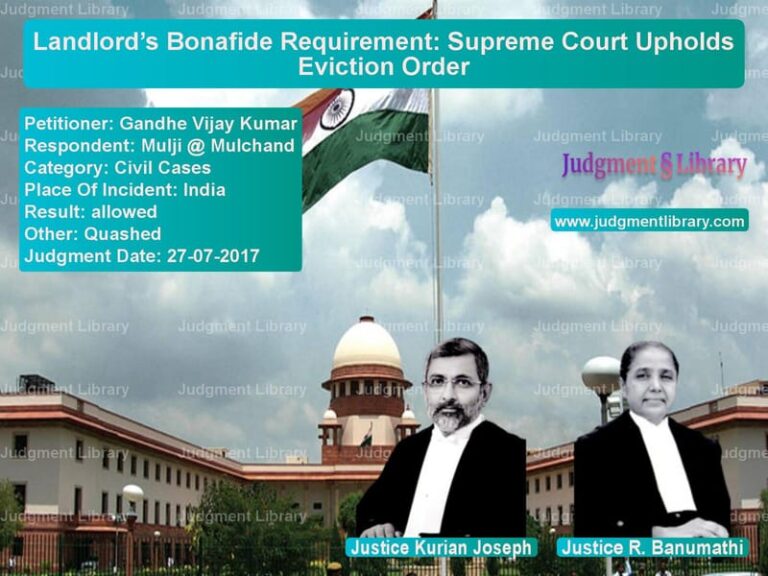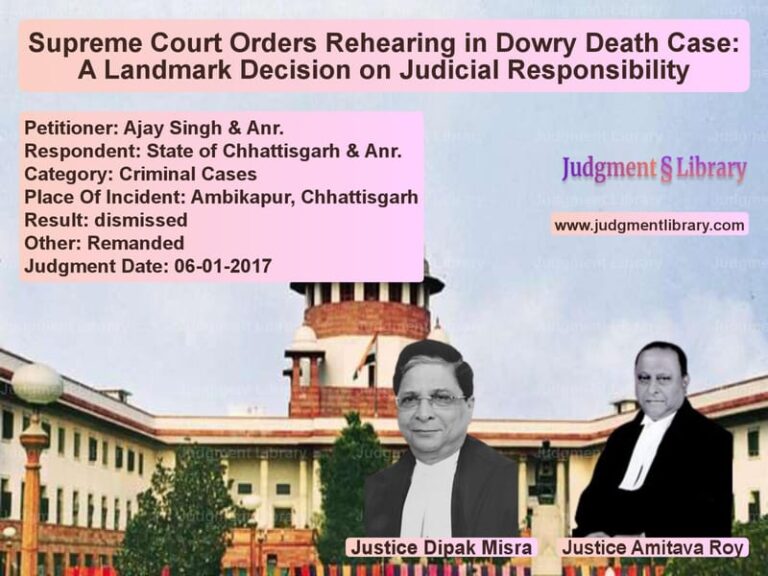Indian Air Force Officer’s Dismissal Converted to Discharge: Supreme Court’s Landmark Ruling
The case of Union of India & Ors. vs. Ex LAC Nallam Shiva is a significant ruling by the Supreme Court of India concerning disciplinary actions within the Indian Air Force (IAF). The case revolved around the dismissal of the respondent, Ex LAC Nallam Shiva, due to prolonged absence from duty. The Supreme Court upheld the punishment but modified it from ‘dismissal’ to ‘discharge,’ ensuring the respondent was not disqualified from future employment.
The ruling underscores the importance of discipline in the armed forces while balancing the principles of proportionality and fairness in imposing punitive measures.
Background of the Case
The respondent, Ex LAC Nallam Shiva, was enrolled in the Indian Air Force on March 28, 2006. During his service, he was promoted to the rank of Corporal. While serving in this capacity, he was granted casual leave from October 20, 2012, to November 4, 2012. However, he failed to report back to duty and overstayed his leave without informing his superiors. His absence continued until he surrendered himself on April 11, 2014, almost 1.5 years later.
As a result of his prolonged unauthorized absence, he was subjected to a District Court Martial (DCM) on November 11, 2014. He was charged under two sections of the Air Force Act, 1950:
- First charge – Section 38(1): Desertion – Alleging that he intentionally remained absent without the intention to return.
- Second charge – Section 39(b): Overstaying leave – A lesser charge, claiming he remained absent without sufficient cause.
The District Court Martial found him guilty of the second charge and sentenced him to:
- Four months of rigorous imprisonment (later reduced to three months by the Air Officer Commanding-in-Chief, WAC, IAF).
- Dismissal from service.
- Reduction in rank.
The respondent completed his sentence and was dismissed from service on February 10, 2015. He then filed a petition under Section 161(2) of the Air Force Act, 1950, requesting reinstatement, which was rejected. He subsequently approached the Armed Forces Tribunal (AFT), Chennai, which modified his punishment and ordered his reinstatement.
Key Legal Issues
- Whether the respondent’s prolonged unauthorized absence warranted dismissal from service.
- Whether the punishment imposed was excessive or disproportionate.
- Whether the Armed Forces Tribunal (AFT) had the authority to order reinstatement.
- Whether the Supreme Court should uphold the dismissal or modify the punishment.
Arguments by the Petitioner (Union of India)
The petitioner, represented by legal counsel, argued that:
- Discipline is paramount in the armed forces, and unauthorized absence of 1.5 years is a serious offense.
- The respondent failed to report his absence to his unit or the nearest military station.
- Although the respondent cited family issues and health concerns as reasons for his absence, he never sought treatment at a military hospital, instead opting for private treatment.
- The Armed Forces Tribunal (AFT) erred in interfering with the punishment imposed by the Court Martial.
Arguments by the Respondent (Ex LAC Nallam Shiva)
The respondent, represented by counsel, countered:
- His absence was due to severe mental stress caused by a matrimonial dispute and his father’s illness.
- His conduct before the incident was exemplary, and this was his first offense.
- Regulation 754(C) of the Defence Service Regulations states that in ordinary circumstances, a first offense should attract a lighter sentence.
- He had already suffered imprisonment and reduction in rank, which should be considered sufficient punishment.
- Reinstating him would allow him to continue his career and support his family.
Supreme Court’s Judgment
The Supreme Court, in a judgment delivered by Justice Dipak Misra, Justice Amitava Roy, and Justice A.M. Khanwilkar, partially allowed the appeal and modified the punishment.
1. Seriousness of the Offense
The Court emphasized that absence without informing superiors is a grave offense:
“Being a member of the Armed Forces, such indiscipline cannot be countenanced. Unauthorized absence for 1.5 years without informing either the unit or the nearest military station is an unpardonable act in a disciplined force.”
2. Armed Forces Tribunal’s (AFT) Overreach
The Court criticized the AFT for interfering in the decision of the disciplinary authority:
“The Tribunal has exceeded its jurisdiction in overturning the punishment imposed by the competent authority and ordering reinstatement.”
3. Modification of Dismissal to Discharge
While upholding the respondent’s guilt, the Court considered his young age and the fact that he had already served his sentence. Instead of reinstatement, the Court ruled:
“In the interest of justice, the dismissal from service is modified to ‘discharge from service,’ which will not disqualify him from seeking employment elsewhere.”
4. Upholding Military Discipline
The Court clarified that while it was showing leniency, it did not mean that absences of such nature would always be treated leniently:
“This decision should not be taken as a precedent to condone serious misconduct in the Armed Forces. Unauthorized absence must be dealt with strictly.”
Key Takeaways from the Judgment
- Military discipline is paramount: The Supreme Court reaffirmed that the armed forces require strict adherence to rules and discipline.
- Unauthorized absence is a grave offense: Absence for prolonged periods without intimation cannot be taken lightly.
- Judicial intervention in military decisions is limited: The Court ruled that the Armed Forces Tribunal had overstepped its jurisdiction in reinstating the respondent.
- Proportionality in punishment: The Court recognized the mitigating factors, modifying the punishment from dismissal to discharge.
Impact of the Judgment
This ruling has significant implications for the armed forces:
- Military authorities retain the power to enforce strict disciplinary measures.
- Tribunals must be cautious in interfering with military decisions.
- Prolonged unauthorized absences will result in strict consequences, even if the punishment is moderated.
- Ex-servicemen discharged under such circumstances can seek employment elsewhere.
Conclusion
The Supreme Court’s ruling in Union of India & Ors. vs. Ex LAC Nallam Shiva upholds the importance of discipline in the armed forces while ensuring proportionality in sentencing. By converting the dismissal to discharge, the Court struck a balance between enforcing military rules and ensuring fairness in disciplinary actions.
This judgment serves as a guiding precedent for handling similar cases in the future, reaffirming that while strict discipline is essential, punitive measures must be proportionate to the circumstances.
Don’t miss out on the full details! Download the complete judgment in PDF format below and gain valuable insights instantly!
Download Judgment: Union of India & Ors vs Ex LAC Nallam Shiva Supreme Court of India Judgment Dated 10-08-2017.pdf
Direct Downlaod Judgment: Direct downlaod this Judgment
See all petitions in Employment Disputes
See all petitions in Termination Cases
See all petitions in Public Sector Employees
See all petitions in Judgment by Dipak Misra
See all petitions in Judgment by Amitava Roy
See all petitions in Judgment by A M Khanwilkar
See all petitions in partially allowed
See all petitions in Modified
See all petitions in supreme court of India judgments August 2017
See all petitions in 2017 judgments
See all posts in Service Matters Category
See all allowed petitions in Service Matters Category
See all Dismissed petitions in Service Matters Category
See all partially allowed petitions in Service Matters Category

